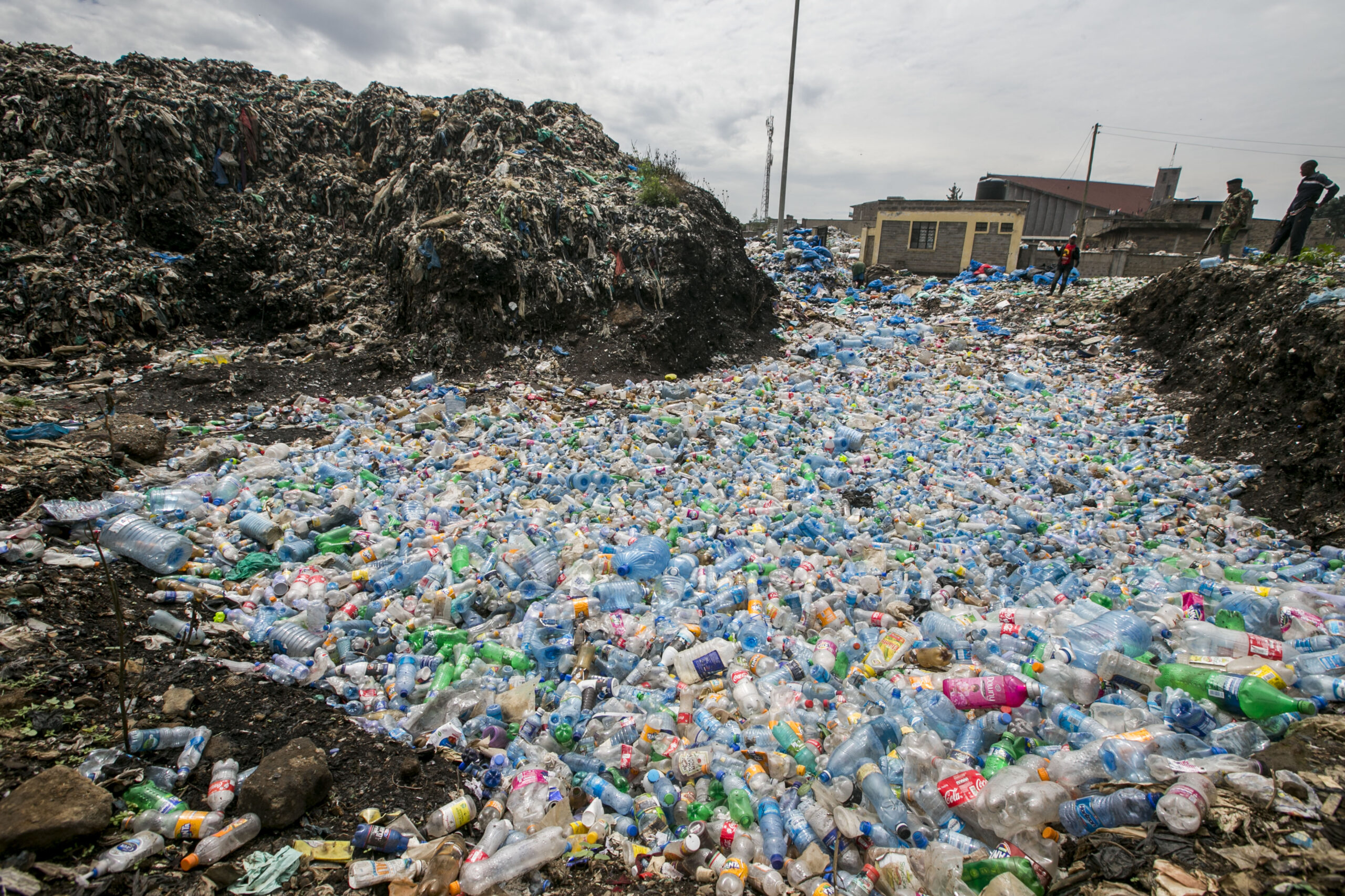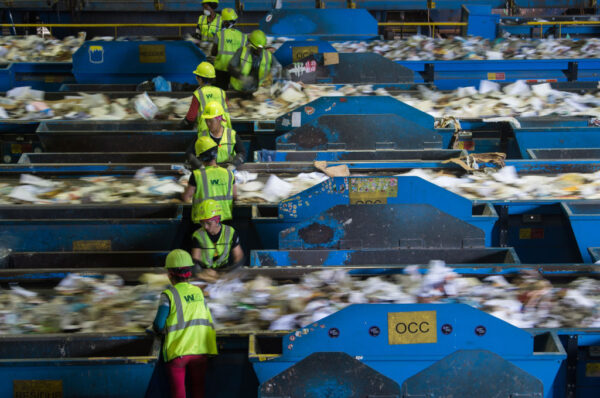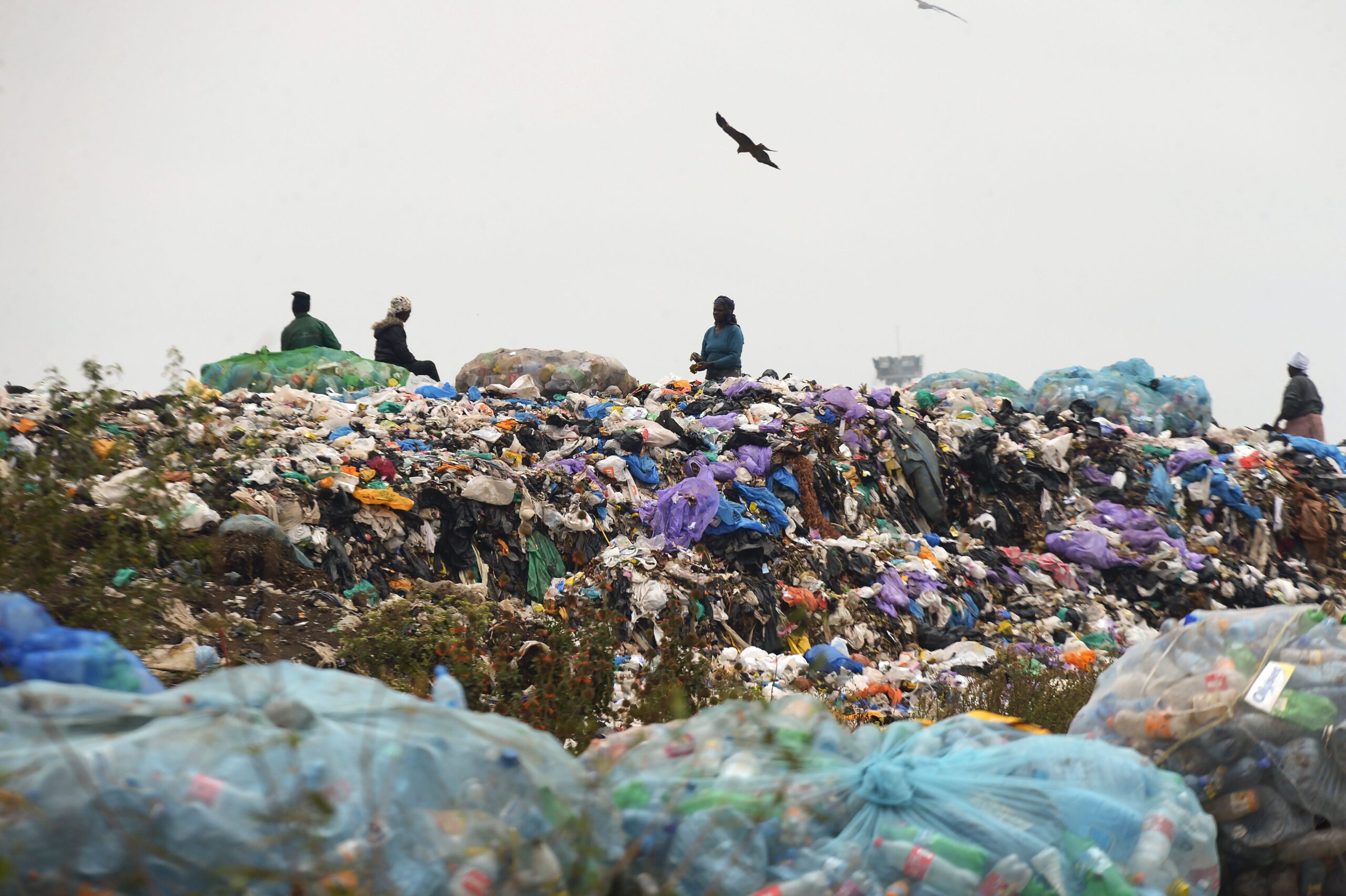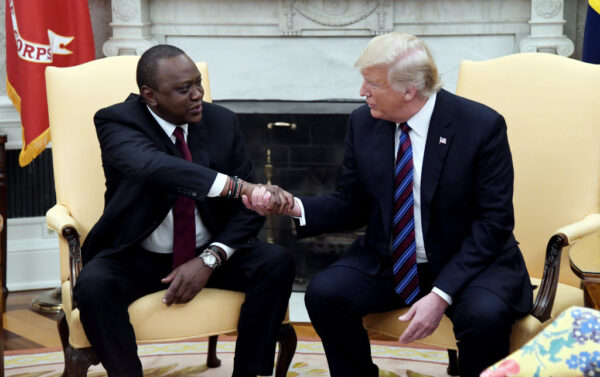De
American Chemistry Council (ACC), een lobbyorganisatie van chemische bedrijven, waar ook oliemaatschappijen als Shell deel van uitmaken, is tegen nieuwe wereldwijde regels
om de stroom van plastic naar arme landen op het zuidelijk halfrond
te beperken....
Niet vreemd dus dat oliemaatschappijen
als Shell, Exxon en Total, plus een aantal grote chemische bedrijven waaronder Du Pont en Dow Chemical, die zijn aangesloten bij de ACC, de Coronacrisis hebben aangegrepen
om bij de, wat betreft milieu maatregelen totaal onverantwoorde, Trump
administratie te lobbyen tegen beperkingen die zijn opgelegd aan het
exporteren van afval plastic.....
Eén van
de landen die men wil gebruiken voor het onverantwoord dumpen van
gigantische hoeveelheden plastic is Kenya, waar al een enorme stroom
plastic uit de VS naartoe gaat........
Als je
nu denkt dat genoemde bedrijven en anderen zich inzetten om de
productie van eenmalig te gebruiken plastic te verminderen, heb je
het helemaal mis, nee zelfs daar weigert men actie op te
ondernemen.....
Nogmaals
geven dit soort bedrijven aan dat ze lak hebben aan het redden van de
planeet zoals wij die kennen, nee: 'Geld über alles....'
Vergeet niet dat Shell al een paar jaar bezig is om haar naam op valse gronden groen te wassen (greenwashing), terwijl de praktijk laat zien dat het bedrijf alles behalve duurzaam bezig is, of zelfs maar poogt echt duurzame doeleinden na te streven, zoals ook uit dit bericht weer blijkt......
Vergeet niet dat Shell al een paar jaar bezig is om haar naam op valse gronden groen te wassen (greenwashing), terwijl de praktijk laat zien dat het bedrijf alles behalve duurzaam bezig is, of zelfs maar poogt echt duurzame doeleinden na te streven, zoals ook uit dit bericht weer blijkt......
Lees het
volgende artikel van Unearthed (onderdeel Greenpeace) over deze zaak
en zegt het voort, de hoogste tijd dat deze bedrijven tot de orde
worden geroepen (boycot Shell, Total en Exxon benzinestations!!), zeker als je ziet dat een aantal van die bedrijven
zoals Shell, zich zoals gezegd in het openbaar voordoen als duurzaam bedrijf dat
'zich echt inzet om de klimaatverandering af te remmen en
vervuiling tegen te gaan.......'
Oil-backed trade group is lobbying the Trump administration to push plastics across Africa

Thousands of plastic bottles lay on the ground at the Dandora rubbish dump, an eastern suburb of Nairobi, Kenya's capital. Photo: Jan Hetfleisch/Getty
Oil-backed trade group is lobbying the Trump administration to push plastics across Africa

Thousands of plastic bottles lay on the ground at the Dandora rubbish dump, an eastern suburb of Nairobi, Kenya's capital. Photo: Jan Hetfleisch/Getty
The
American Chemistry Council also pushed back against new global rules
that will restrict the flow of plastic waste to the global south
A lobby
group representing oil and chemical companies, including Shell,
Exxon, Total, DuPont and Dow, has been pushing the Trump
administration during the pandemic to use a US-Kenya trade deal to
expand the plastic and chemical industry across Africa.
Documents obtained by Unearthed show the same lobby group – and the US recycling industry – also lobbied against changes to an international agreement that puts new limits on plastic waste entering low- and middle-income countries.
Several of the companies in the American Chemistry Council (ACC) – including Shell, Exxon and Total but not BP – were the founders of a $1bn initiative that pledges to create “a world free of plastic waste”.
In public letters to top officials at the US Trade Representative (USTR) and US International Trade Commission (USITC), the ACC writes: “Kenya could serve in the future as a hub for supplying U.S.-made chemicals and plastics to other markets in Africa through this trade agreement.”
The letters also call for the lifting of limits on the waste trade, a move which experts say amounts to an attempt to legally circumvent the new rules on plastic waste, rules which – the documents reveal – the firms had also vigorously opposed.
Kenyan environmentalists said the proposals would mean that “Kenya will become a dump site for plastic waste”.
US Democratic Senator Tom Udall, who last year introduced legislation to tackle the plastic waste crisis accused the companies of “double dealing.”
He told Unearthed: “It is outrageous that petrochemical and plastic industries claim the solution to our mounting plastic waste crisis is to produce more disposable plastic. These same companies and corporations then point the finger at developing nations for the plastic waste showing up in our oceans. This double-dealing makes clear what the true source of our plastic waste crisis is: companies and corporations off-shoring their responsibilities to make billions of dollars… Requiring these companies to take responsibility for their excessive waste and pollution is the only way we will tackle our colossal plastic waste problem.”

Workers
sort recycling material at a waste management facility in Maryland.
US waste, including plastic, is often shipped overseas to poorer
countries. Photo: Saul Loeb/AFP via Getty
The
ACC is a major trade association for chemical companies, including
Dow
and DuPont, as well as the petrochemical arms of some of the oil
majors. Although BP is a member, it does not produce any plastics and
last month sold
off its
petrochemicals business to Ineos. A spokesperson told Unearthed
that
their work with the ACC focuses on Castrol lubricants, which are
used in the
automotive industry. Basel Convention
Following public outcry about plastic waste, in May last year, new rules agreed under a global treaty called the Basel Convention mean that as of 2021, almost all countries outside the OECD will be prohibited from trading mixed, contaminated or unrecyclable plastic with the US, because it is one of the few countries not party to the Convention.
The OECD has not yet ruled on whether it will accept the new plastic waste rulings, following objections from the US. The Basel Convention provides a limited exception which would allow continued trade between the US and the 37 member countries of the OECD, but only if those countries adopt standards on plastic waste as strong as those in the Convention.
The 187 countries that are part of the treaty will have to partake in a procedure to obtain prior informed consent from importing countries, a procedure which requires checks on environmental processing facilities.
Unpublished documents obtained by Unearthed under the Freedom of Information Act (FOIA) show that the oil and chemical industry lobby group wrote to the Secretariat of the Basel Convention in March 2019.
It objected to the new rules on the basis that they would create a “regulatory burden”, lead to shipping delays, logistical issues and increased costs. It forwarded its letter to the Office of the US Trade Representative (USTR) two weeks later, requesting a meeting to discuss its concerns.
The documents also reveal that the Institute of Scrap Recycling Industries (ISRI) – a major trade association representing the US recycling industry – lobbied against the new rules on the basis that they could severely limit US exports, discourage legitimate trade and exacerbate marine litter by preventing plastic from reaching recycling facilities.
“In principle, we would prefer the proposals not be adopted and maintain the status quo,” they wrote in an email sent to USTR on 3 April 2019.
A spokesperson from the ACC told Unearthed the basis of their concerns regarding the new Basel restrictions was that they “could very well limit the ability of African and other developing countries to properly manage plastic waste,” because they will restrict their capacity to export materials to other countries.

Academics,
civil society and politicians are concerned that Kenya - and other
African countries - do not have the infrastructure to manage
increasing plastic production and exports. Photo: Simon Maina/AFP via
Getty
According to ISRI, in 2018 the US imported more than 92,000 metric tons of plastic waste from non-OECD countries.
However, in the first six months of that year, US exports to China, Hong Kong, India, Malaysia, Thailand and Vietnam alone – all countries outside the OECD – totalled 480,432 tons. These exports are five times the US imports in half the time.
The Trump administration backed the industry position – opposing the implementation of the new rules at the OECD. US opposition has led to concerns over whether the country will seek ways around the changes.
“It appears that loopholes are being sought to continue the trade in plastic waste. Once in Africa, the emerging free trade routes could be used to facilitate transboundary movements to other African countries. The African Union and its member states should be on the look-out.”
Demand for petrochemicals is expected to rocket in coming decades, with companies expected to be looking to low- and middle-income countries to expand the market. Plastic is already the US’ biggest export to Kenya, with sales totalling $58m in 2019.
In their letters to the Trump administration regarding the US-Kenya FTA* earlier this year, the ACC called for it to “prohibit imposition of domestic limits on production or consumption of chemicals and plastic and restrictions on cross-boundary trade of materials and feedstocks”. Feedstocks could include plastic waste for recycling.
They added that the US and Kenya should “enable trade in waste for the purposes of sound management and recycling consistent with relevant international commitments”.
Even so, David Azoulay, an attorney and director of the environmental health programme at the Center for International Environmental Law told Unearthed: “The suggestion to use this potential agreement to preempt any national limitation on plastic production and consumption is a clear indication of the ACC’s objective to leverage such a trade agreement to circumvent global efforts to curb plastic production and use, as well as newly adopted provisions from the Basel Convention to better control the global plastic waste trade.”

US
president Donald Trump shakes hands with Kenyan president Uhuru
Kenyatta during a bilateral meeting in the Oval Office of the White
House in 2018. Photo: Olivier Douliery-Pool/Getty
Jim
Puckett, executive director of the NGO Basel Action Network commented
that it would also contradict the Bamako Convention, a separate
treaty in Africa.
“The effort to enlarge trade in waste and harmful chemicals in between the US and Kenya is a rather insidious effort that, if taken across Africa would go head to head against Africa’s Bamako Convention – a treaty which prohibits virtually all plastic waste imports into Africa as well as the import of many hazardous chemicals,” he told Unearthed.
Kenya
Environmentalists are concerned the deal could also undermine national efforts to limit plastic consumption, including new rules on plastic bags.
Sub-Saharan Africa is thought to lead the world on plastic bag laws, according to reports, with 34 countries adopting taxes or bans.
Dorothy Otieno, the plastics programme co-ordinator at the Centre for Environment, Justice and Development (CEJAD) in Kenya, told Unearthed that this trade deal could threaten the momentum and change created by these efforts.
“As a country we have made strides to reduce the plastics that are used here, and which end up as waste – there is a ban on use and manufacture of carrier bags and recently a ban on plastic in protected areas – so this trade deal would diminish what we have achieved as a country.”
But Kenyan politicians and trade groups said such fears will be addressed. Negotiations began several weeks ago, but have recently stalled due to coronavirus concerns.
Cornelly Serum, an MP for the ruling Jubilee Party and member of the Trade and Industry Parliamentary Committee, told Unearthed: “Fears that under the trade deal use of plastics might be reintroduced into the country are valid… Trade associations planning to expand their businesses in Africa – and mainly in Kenya – are welcome but cannot use the deal to introduce materials that have so far been banned and as a parliament we will not allow any protocols likely to ruin our economy.”
Carol Karuga, CEO of broad-based lobby group the Kenya Private Sector Alliance, added: “It does not augur well to ban use of plastics materials in the economy and later reintroduce the same through a trade deal… The deal before it is finally agreed will have to be checked at all levels.”
Otieno also expressed concerns about the impact of more waste. “There would be an increase in waste – some will be reused and recycled but the majority will end up in dump sites. We will end up in a situation where Kenya will become a dump site for plastic waste,” she said.
“It clogs our waterways and our drainage systems and leads to flooding. We also see the effect of pollution from the burning of plastics – it produces dioxins and furans that lead to respiratory diseases… Somebody can burn these wastes right next to your house and suffer the impacts. We also see the aesthetic value of our towns being reduced because of plastics.”
Last year, some of the ACC companies – including Shell, Exxon and BASF – alongside major consumer goods and waste management companies launched the Alliance to End Plastic Waste (AEPW), committing $1bn, in part to finance waste management projects to clean up and prevent plastic waste in Africa and Asia.
In the public letters, the ACC wrote that: “There is a global need to support infrastructure development to collect, sort, recycle, and process used plastics, particularly in developing countries such as Kenya.
“Such infrastructure will create opportunities for trade and investment and help keep used plastics out of the environment, thereby reducing marine litter… The U.S. and Kenya can play a strong role together in promoting innovative circular economy solutions in East Africa that enable universal access to better waste management capacity and for used plastics in all countries.”
Voor de
rest van het artikel, zie het origineel.
* FTA: Free Trade Agreement, ofwel vrijhandelsverdrag.
Zie ook:

